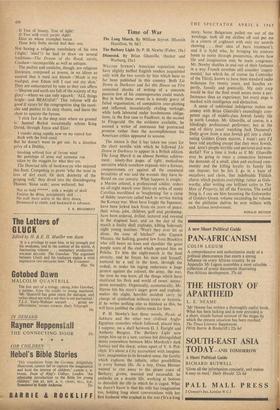Time of War
The Barbary Light. By P. H. Newby (Faber, 18s.)
WILLIAM STYRON'S American reputation may have slightly baffled English readers acquainted only with the two novels by him which have so far been published in this country. Both Lie Down in Darkness and Set this House on Fire contained chunks of writing of a concrete passion few of his contemporaries could match. But in both these swam in a moody gravy of failed organisation, of compulsive over-plotting and inflamed, incantatorily circling verbiage; while both laboured under burdensome obliga- tions, in the first case to Faulkner, in the second to Fitzgerald. On the evidence available, he seemed a writer of enormous but protracted promise rather than the accomplishment his American critics appeared to assume.
The reason is that it has taken ten years for the short novella with which he followed Lie Down in Darkness to appear in a British edition. The Long March is an almost flawless achieve- ment : ninety-five pages of tight, meticulous narrative which somehow expands into a furious, compassionate cry against all the unnatural brutalities of war and the wounds they have in- flicted on our century. What happens is simple : a Marine colonel, a professional soldier, orders an all-night march over thirty-six miles of sandy Carolina marshland as 'toughening' for a camp of flabby reservists called back to service during the Korean war. Most have fought the Japanese; have been jerked back from six years of peace, their wives, jobs, children, golf and gardening; have been ordered, drilled, lectured and sweated in the stagnant heat; and on the day of the march a faulty shell explodes, killing hideously eight young marines. 'Won't they ever let us alone, the sons of bitches?' sobs Captain Mannix, the hulking, goaded Jew from Brooklyn who still bears on knee and shoulder the great purple scars of the steel which sprayed him on Peleliu. To him the night-march is the final atrocity, and he forces his men and himself, tortured by a nail in the boot, through the ordeal, to make his raging endurance a huge protest against the colonel, the army, the war, the time he was born, all the things which have mutilated his flesh and world of sweet, anony- mous normality. Organically, economically, Mr. Styron lets his story's anger grow and explode; makes the slight, horrible incident carry its charge of symbolism without strain or hysteria. If he writes nothing else as finished as this, he will have justified the claims made for him.
P. H. Newby's last three novels, Picnic at Sakkara and the other two civilised Anglo- Egyptian comedies which followed, placed him, I suppose, on a shelf between D. J. Enright and Anthony Burgess. The Barbary Light now jumps him up to a new, curious but distinguished status somewhere between Miss Murdoch's dark fantasy and the sharp, urban upset of V. S. Prit- chett. It's about a City accountant with imagina- tion; imagination in its broadest sense, the faculty which explores the infinite, other possibilities in every human life. As a boy, Owen Hanner wanted to run away to the pirate coast of Barbary; grown, married and successful, he embarks on a double life, working at bottom to demolish the life in which he is caged. What he doesn't know is that his wife has imagination too, holding long silent conversations with her first husband who crashed in the war (It's a long
story. Some Bulgarians pulled me out of the wreckage, took all my clothes off and put me in a cistern of yoghourt with only my nostrils showing . . . their idea of burn treatment'); and it is Sybil who. by bringing his mistress home to nurse through pneumonia, shows how life and imagination may be made congruent. Mr. Newby shuttles in and out of their fantasies in a way French novelists still consider 'experi- mental,' but which he, of course (as Controller of the Third), knows to have been standard radio technique for twenty years, and handles ex- pertly, funnily and poetically. My only carp would be that the final result seems more a per- formance than an experience; but every page is marked with intelligence and distinction.
A sense of subliminal indulgence makes me uneasy with Brian Glanville's exceedingly com- petent saga of middle-class Jewish family life in north London. Mr. Glanville, of course, is a blindingly professional performer; but at the end of thirty years' watching Jack Diamond's Dolly grow from a nice Jewish girl into a child- eating Golders Green matron, I wasn't sure I'd been told anything except that they were Jewish, and aren't-people-terrible-and-perverse-and-won- derful? For a time it looks as if Mr. Glanville may be going to trace a connection between the demands of a small, alien and enclosed com- munity and the killing loyalty its family life can impose; but he lets it go in a haze of tnazeltovs and chein, that indefinable Yiddish charm which pardons everything; rather as Gals- worthy, after writing one brilliant satire in The Man of Property, let off the Forsytes. The awful thing is, I can see him becoming the Galsworthy of Golders Green, volume succeeding fat volume on the philistine shelves he now withers with such furious involvement.
RONALD BRYDEN


































 Previous page
Previous page